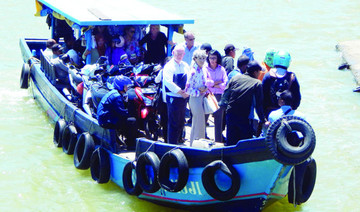CANBERRA: Australia and Indonesia cemented a landmark new defense pact Tuesday, pledging closer cooperation in the Asia-Pacific region as a new leader prepares to take over in Jakarta.
The pact – which includes provisions for joint drills and deployments to each country – was unveiled during Indonesian defense minister and president-elect Prabowo Subianto’s visit to Canberra.
Prabowo takes the reins of the world’s third-largest democracy on October 20.
Speaking after meeting Australian Prime Minister Anthony Albanese, Prabowo said the defense deal represented a “very good outcome” that would be “beneficial to both our countries in the future.”
Aside from defense, Prabowo expressed a wish for Australian cooperation on the economy, agriculture, food security and curbing international drug trafficking.
“We would like to see more Australian participation in our economy,” Prabowo told reporters at Australia’s Parliament House.
“I am determined to continue this good neighbor relationship... Australia plays a very important role for us.”
Since being elected in February, the ex-special forces commander has also visited China and Japan, displaying a keener interest in foreign affairs than incumbent Joko Widodo.
During Widodo’s decade-long tenure, he never attended the UN general assembly in New York, rarely spoke a foreign language and was regularly chided for taking little interest in foreign affairs.
On Tuesday, Prabowo said he wanted to follow the “general policies” of his predecessor, but also forge closer ties with Canberra.
“Prabowo is much more interested in international affairs,” said Greg Raymond, a foreign affairs expert from the Australian National University.
“He will look to bring Indonesia into international issues. He’s very confident, he’s very knowledgeable, and he’s very comfortable in international settings.”
Australian Defense Minister Richard Marles said the defense pact was one of the most significant agreements ever negotiated between the two nations.
Australia also hopes to cement close ties as the region is riven by rivalry between China and the United States.
Separated by less than 300 kilometers (186 miles) at their closest point, Indonesia and Australia have charted different courses while navigating those geopolitical upheavals.
Canberra has drawn ever nearer to longtime ally the United States, bolstering its military in an attempt to deter the might of a rising China.
Jakarta has meanwhile walked a more neutral path, wary of drawing too close to Washington and far less willing to needle Beijing.
The defense agreement has been in train since February last year, but the details remain under wraps for now.
Analysts anticipate maritime cooperation will be a focal point – a hot topic given unresolved tensions in the South China Sea.
“It’s very much about the practical arrangements, making military exercises and cooperation easier,” Raymond said.
“It might also cover logistics. So the traveling country can use the other’s facilities, ammunition, logistics support and similar things.”
Trade between Australia and Indonesia meanwhile remains far trickier terrain.
A flood of cheap Indonesian nickel threatens to crash international prices and all-but wipe out a once-profitable Australian sector.
Indonesia and Australia are the world’s two biggest thermal coal exporters, and both are anxious to shed their economic reliance on polluting fossil fuels.
While nickel remains a point of tension, there are other areas – such as electric vehicle manufacturing – where opportunities abound.
Indonesia’s president-elect Prabowo visits Australia, unveils defense pact
https://arab.news/wka3j
Indonesia’s president-elect Prabowo visits Australia, unveils defense pact

- Prabowo Subianto takes the reins of the world’s third-largest democracy on October 20
- ‘I am determined to continue this good neighbor relationship... Australia plays a very important role for us’


























